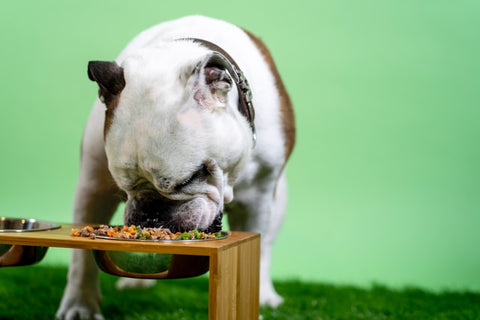Whenever you’re dealing with a dog with diarrhea, it can be very disheartening and troublesome as a pet owner. You would want to ensure that your dog’s diarrhea stops as soon as possible. Well, feeding your dog the right food in the right way can help to speed up the healing in your dog’s gut.

Photo by Aditya Joshi on Unsplash
When to feed a dog with diarrhea?
First of all, you have to ensure that your dog’s diarrhea is not a cause of concern or a medical emergency. Then, once you have ruled that out, how do you know that your dog’s body is ready for food?
Keep in mind that your dog’s gastrointestinal (GI) tract needs rest. By withholding food for a while, it rests the GI tract and allows the intestines to heal as the intestines are not busy digesting food.
How long you withhold food after your dog has diarrhea depends on several factors such as:
- Age of dog
- Size of dog
- The underlying cause of diarrhea
- Other medications administered
If your adult dog is generally healthy, you should first try not feeding food for 12 hours. Make sure that water is always available for your dog.
However, please note that you should not stop food for too long for dogs that need regular feeding such as puppies, toy breeds, senior dogs, and dogs with health issues. Instead, bring your dog to the vet if it falls under the said categories and purging, because if untreated immediately can lead to a severe medical emergency.
Try the following food if your dog has diarrhea or when you observe an unhealthy gut.
1. Protein
Lean protein or low-fat meat is gentle on your dog’s GI tract. Try the following meats:
- Chicken breast without the skin
- Lean ground hamburger
- Turkey meat
Do not add any seasoning, oil, butter, or salt to it. Chop the meat into small bites and keep it as bland as possible.
2. White riceHigh-quality white rice is a healthy choice for dogs with diarrhea as it provides the necessary calories without much flavor. You can also consider mixing the above lean protein with white rice at a 50/50 ratio.
3. PotatoesDogs with diarrhea can easily digest both white and sweet potatoes. However, you have to cook the potatoes first as it contains a compound called solanine, which is toxic for dogs. Cooking the potatoes reduces the levels of solanine and is safe for dogs to eat.
Do not add any seasoning to the potatoes.
4. PumpkinAs pumpkin has high fiber content, plain pumpkin can help a dog with diarrhea as it will help to regulate the dog's digestion.
Offer your dog small teaspoons of pumpkin (for small breeds) and 1-3 tablespoons (for large dogs).
5. Prescription dog foodThere are dog food brands that target specific health issues such as dog diarrhea. Your vet may also recommend some food types such as raw dog food that may help to boost their appetite and have better digestion.
If your dog is suffering from diarrhea due to allergies, dog food for sensitive stomach may be a good option.
6. Bone brothBone broth can soothe and heal your dog’s gut whilst providing the nutrition and hydration it needs to replace lost fluids. Seeing as it is likely that your dog will not have much of an appetite after having diarrhea, the extra flavor that comes with the bone broth being added to its dry food will encourage your dog to eat a little.
Try PetCubes’ bone broth which is simmered over 72 hours in small batches and packed with amino acids, vitamins, and minerals with no added preservatives. It is nutritious and delicious, and ready to serve!
How to feed a dog with diarrhea?

Always start with a small amount of food to ensure that the food does not irritate your dog’s GI tract.
For small dog breeds, begin with a tablespoon of food only.
It’s better to feed A slightly larger portion of food for larger dog breeds. Two tablespoons is sufficient.
If your dog does not exhibit further signs of its stomach being upset, slowly increase the amount of food you feed it. Continue with a bland diet until you observe that its stools are normal for at least two days.
Slowly transition your dog back to its regular diet by mixing a small amount of its usual food with bland food. Then, increase the regular to bland food ratio until the diet is back to normal.
Conclusion
If your dog’s diarrhea is not resolved within two days, it is time to call your veterinarian. Feeding your dog a bland diet with the recommended food will help ease your dog’s stomach issues. Serve the food in small amounts, and hopefully, your dog will recover on its own.


